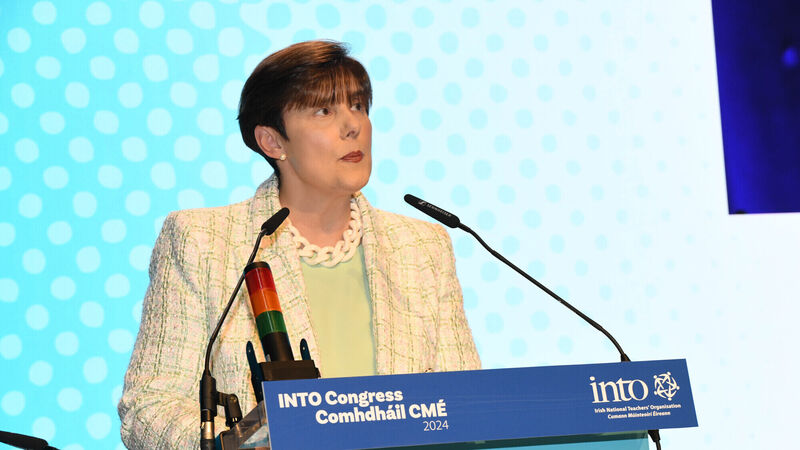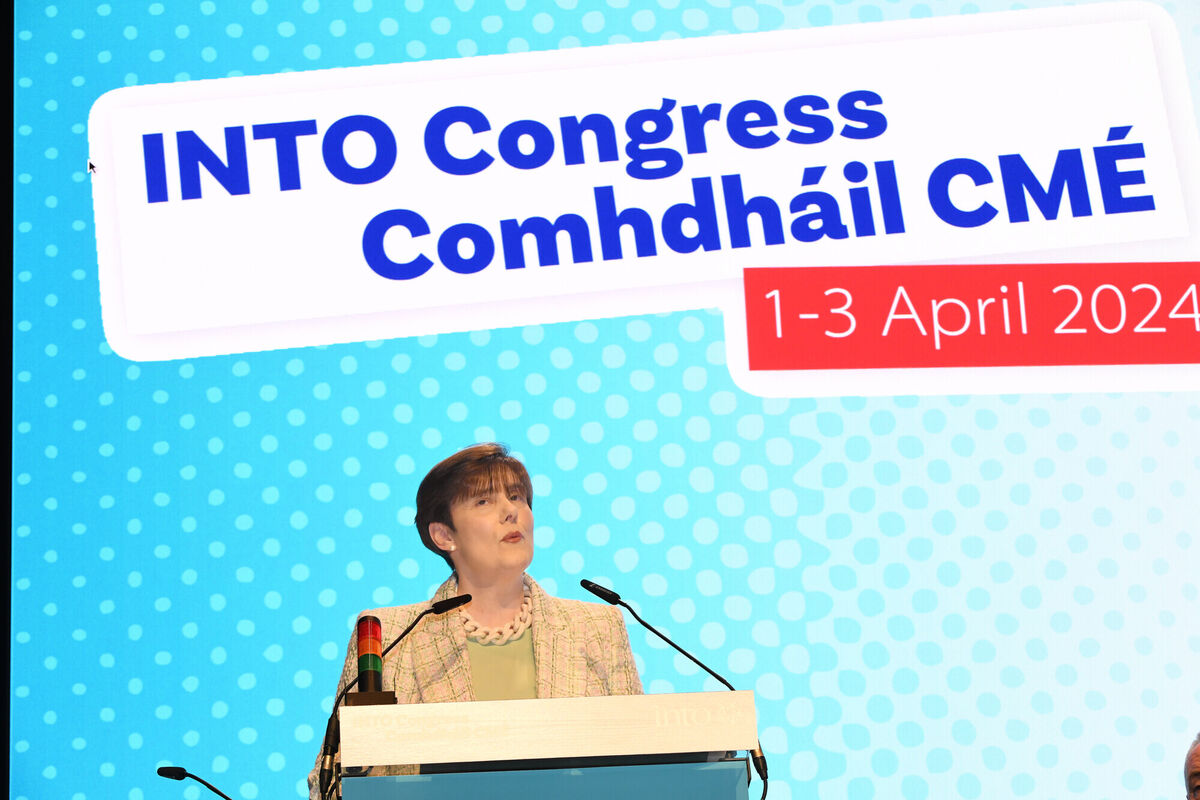Two starkly differing perspectives on education spending at INTO conference

Norma Foley addressing delegates at the Irish National Teachers' Organisation annual congress in Derry. Picture: Moya Nolan
There were two starkly differing perspectives on education spending at the Irish National Teachers' Organisation (INTO) AGM with Minister Norma Foley insisting it is plenty, in contrast to the union which says it is not nearly enough.
In a press conference ahead of addressing delegates, Ms Foley reflected on how far the education system has come since the last INTO conference was held in Derry, 90 years ago.
“90 years ago, class sizes were 50 students plus, now they have been reduced to a ratio of 23 students per teacher," she said.
And so, the tone was set, with the minister appearing unflappably and impenetrably optimistic.
On poor funding in education, she questioned Ireland’s rank as the lowest in the The Organisation for Economic Co-operation and Development (OECD). “It depends on who is articulating it,” she told the
Referring to the data that compares the percentage of government spending on education, she said: “Some people would say that the Modified Gross National Income (GNI) is a fairer reflection and under that, we are fair performers.”
This is not a currently included in the OECD’s calculations, however. Data is compared using two measures: expenditures on public and private education institutions per full-time-equivalent (FTE) student, and total government and private expenditures on education institutions as a percentage of gross domestic product (GDP).
“We are also third in spending as a department, and during my tenure we have gone from a budget of more than eight billion to more than €10bn. That is a considerable endorsement,” the minister said.
Ms Foley posited that funding is only one aspect, and that many initiatives on the ground are improving children’s experience of school.
A few hours later, in her main address to delegates, she put Ireland’s education sector into a more international context, calling to mind the atrocities occurring in Gaza. Her comments garnered a huge response from the audience, with clapping thundering down the aisles. She then spoke of the increasing diversity in Irish schools, referencing the integral work of teachers.
“I have visited hundreds of schools, and my message is very consistent when I address staff and students. I tell them that their investment in the school is what really makes the school what it is,” she said.
Her department has made huge improvements during her tenure, she said.
“In total, there have been more than 5,000 extra primary school teachers employed since the 2019/2020 school year, bringing the number of primary teachers to 43,000 in this school year.”
In stark contrast to the address by the president of the INTO earlier in the day, she said: “As you are aware, I managed, over the course of three budgets, to bring down the pupil: teacher allocation ratio to an average of 1 classroom teacher for every 23 pupils in all primary schools for the current school year. That is the lowest ever seen at primary level.”
Whatever frustrations the INTO might share, class sizes are indisputably, as she included, “at the lowest level ever seen at primary level,” but this is still above the European average.
Later in her address she seemed to make an error, saying that class sizes were now favourably compared to the OECD average of 15:1.
The auditorium shouted out in protest and were reminded by President Dorothy McGinley to show ‘respect.’

Despite palpable anger among delegates at the treatment of children with additional needs, Ms Foley lauded her department’s improvements in the area.
“More and more schools are putting their hands up to take special classes. We will have 400 more established in September. It has truly been a shining example of inclusion in education.
Some might have questioned the choice of language “putting their hands up,” potentially hitting the wrong note among educators in the auditorium.
However, in response to complaints regarding the absence of wraparound supports for children with complex needs, a lack of funding, Ms Foley said: “I am conscious the Department of Education cannot take over the role of the HSE and its trained staff. But it can work on new models, such as the in-school counselling service, which for the first time ever is placing counsellors into schools to work with students, teachers, and parents.”
The minister was also proud to share Ireland’s excellent international reputation in education. When asked to explain how Ireland continues to outperform peers in maths and literacy when travelling abroad, she reported having “no hesitation in telling them that the success is down to the excellent, committed and talented teachers working tirelessly in every classroom in Ireland in our schools.”
She was keen to emphasise the work she has carried out in response to increased smartphone usage in schools, and the research that is ongoing in relation to AI. But she put teachers front and centre and under the limelight in her closing remarks.
“The best frameworks in the world are of no use without the dedication and commitment of those standing in the classroom day in and day out.”
This focus on teachers was noted in General Secretary John Boyle’s response.
“Teachers deserve to be rewarded, recognised, and remunerated commensurate with their qualifications and for specialised work, " said.
“Invest in education, empower the best teachers. It really is that simple. We need action, not apathy. Talks and reports won't fill empty classrooms,” he continued.
Referencing the teaching recruitment and retention crisis he said: “We are losing our best and our brightest.”
“You need to be ruthless at cabinet to resolve the recruitment and retention crisis, otherwise your legacy over the education brief will not be what I know you want it to be.”
Speaking of classroom sizes he reiterated the union’s position.
“You slammed on the brakes on class size reductions. You missed an unprecedented opportunity to bring an end to Ireland’s shameful largest class sizes in the Eurozone.” He called out the Minister’s error and urged her not to mention class sizes.
On overall spending he commented: “During your ministry, the annual expenditure on education has increased by €5bn. While this has been welcome, I want to put some perspective on it. Between 2009 and 2017 education budgets were slashed. Since you took office, the percentage of total government expenditure allocated to your department has hovered at around 10%. It was once closer to 19%. But the OECD has repeatedly highlighted that at 10% less than the OECD average per pupil, Ireland is simply not spending enough on primary education.
“We should be investing 20%” he said.












